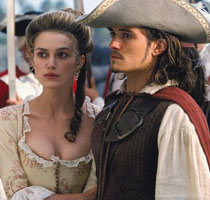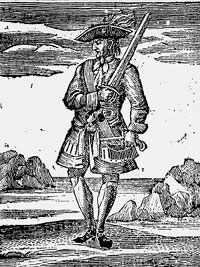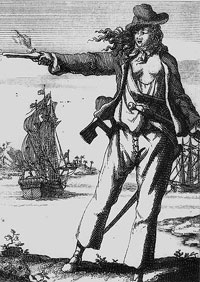《加勒比海盗》1(精讲之六)
影片对白
 Jack: Why is the rum gone?
Jack: Why is the rum gone?
Elizabeth: Just wait, Captain Sparrow. You give it one hour, maybe two, keep a weather eye out and then you will see white sails on that horizon.
Jack: Must've been terrible for you to be trapped here, Jack. Must've been terrible for you... Well it bloody is now! There'll be no living with her after this.
Elizabeth: But we've got to save Will!
Gov. Swann: No! You're safe now. We will return to Port Royal immediately not go gallivanting after pirates.
Elizabeth: Then we condemn him to death.
Gov. Swann: The boy's fate is regrettable. But then so is his decision to engage in piracy.
Elizabeth: To rescue me, to prevent anything from happening to me!
Jack: If I may be so bold as to interject my professional opinion. The Pearl was listing near to scabbers after the battle. It's very unlikely she'll be able to make good time. Think about it. The Black Pearl. The last real pirate threat in the Caribbean, mate. How can you pass that up?
Norrington: By remembering that I serve others, Mr. Sparrow, not only myself.
Elizabeth: Commodore, I beg you, please do this for me. As a wedding gift.
Gov. Swann: Elizabeth. Are you accepting the Commodore's proposal?
Elizabeth: I am.
Jack: A wedding! I love weddings, drinks all around! I know. Clap him in irons, right.
Norrington: Mr.Sparrow. You will accompany these fine men to the helm, provide us with the bearing to Isla de Muerta. You will then spend the rest of the voyage contemplating all possible meanings of the phrase "silent as the grave". Do I make myself clear?
Jack: Inescapably clear.
Parrot: Shiver me timbers.
Gibbs: Cotton, he says you missed a bit.
Will: You knew William Turner?
Pirate: Old Bootstrap Bill ...we knew him. Never sat well with Bootstrap what we did to Jack Sparrow. The mutiny and all. He said it wasn't right with the code.
妙语佳句,活学活用
1. Keep a weather eye out
这个片语也写作keep a weather eye on / open,意思是"Be extremely watchful or alert 小心,注意",例如:We should keep a weather eye on our competitors in case they start a price war.
2. Make good time
"在短时间内做长途旅行"的意思,例如:We made good time, getting to Vermont in only four hours.
3. Pass up
意为"Let go by, reject 放弃,拒绝",例如:I can't believe Betty passed up the chocolate cake.
4. Shiver my timbers
Shiver my timbers (often misquoted as Shiver me timbers) is an exclamation in the form of a mock oath usually attributed to the speech of pirates in works of fiction. 文学家们常用这一词语来表示"震惊,惊讶或是恼怒"。当船在海上航行遇到风浪的时候,海浪使得船上下摇晃,船员感到很恐惧,由此引出了这个shiver my timbers。
5. Sit well with
"Please, fit or suit, be acceptable to 合适,接受"的意思,例如:I don't think that explanation sits well with the headmaster.
文化面面观
历史上著名的海盗
Edmund Cook (Cooke)
1679-81? English. Ship: Trinity. Cook was among the few buccaneers with a semi-legitimate excuse for his piracies. In December 1673, as he headed toward England with valuable goods (possibly smuggled out of Cuba), a Spanish vessel captured his ship near Havana and turned her crew adrift. Claiming that Madrid refused to reimburse his losses, Cook acquired a letter of reprisal. Early in 1679, he landed in Cuba, ambushed a Spanish ship, and sold her cargo in Jamaica.
William Dampier was hired as a surgeon by Cook and a Captain Lynch, who planned to sail together. However, Cook's small ship was alone when he reached the Panamanian coast in February 1680. There he ran into Bartholomew Sharp's company, which had just sacked Portobelo. Excited by their success, Cook and his men enlisted in a new adventure. Under John Coxon's command, the pirates marched across the Isthmus and won a fierce battle near Panama City on May 3.
Soon after the battle, Cook received command of the 100-ton Mayflower, captured at Pueblo Nuevo. But her crew refused to accept Cook as captain and he moved to Sharp's flagship, the Trinity. Cook joined in raids along the Peruvian coast and was still on board when they reached the Juan Fernandez Islands in January 1681.
After another mutiny, John Watling took Sharp's place as captain and immediately imprisoned Cook in irons for homosexual acts. Since homosexuality was commonplace among the buccaneers, Watling's act is difficult to understand. Cook is not mentioned again, and he probably died soon after.
John Rackham ('Calico Jack')

Contemporay picture of John Rackham
July 1718 to November 1720. English. Ships: William. Nicknamed 'Calico Jack' because he wore clothing made of calico (a white cloth imported from Calcutta, India), John Rackham was typical of many pirates whose sloops preyed on coastal shipping. Little is known of his origins, but by 1718 he had somehow made his way to New Providence Island. He served with Charles Vane, fleeing the Island when Vane escaped from Governor Rogers. By the spring of 1719 he was elected as quartermaster, and became Vane's deputy. Soon after a quarrel broke out among the crew, and Rackham replaced Vane as the Captain. Vane was put ashore and Rackham continued Vane's cruise in two sloops.According to some accounts the vessels were both lost when a Jamaican based patrol sloop captured them while most of the crew were ashore. Rackham returned to New Providence, and in May 1719 he was granted a pardon by Governor Rogers as a part of Rogers' general pirate amnesty. It was there he met Anne Bonney, wife of James Bonney, and they became lovers. Law-abiding life ashore proved unpalatable, and in August 1719, with other former pirates, Rackham and Bonney stole a sloop named William, and returned to piracy. His crew included the female pirates Anne Bonney and Mary Reade. Based in Bahamian waters, he cruised between Bermuda and Hispaniola, capturing several ships and a number of profitable cargoes. He then sailed around Cuba attacking local craft before reaching the north coast of Jamaica. There his luck ran out. While at anchor off the western tip of the island, he was surprised by a sloop belonging to the Governor. Most of Rackham's nine male crew were drunk, but according to testimonies the women roused the men into action. The William cut her anchor cable and fled, but was overhauled by the Jamaican sloop during the night. The ships exchanged fire, and then Captain Barnet led a boarding party onto the deck of the pirate vessel. Bonney and Reade were the only members of the crew who offered any kind of resistance. Rackham himself was apparently too drunk to defend himself. The women were overcome, and the pirates were taken to Port Royal to stand trial. He was tried on November 27th and hanged the next day.
Anne Bonney

Contemporay picture of Anne Bonney
July 1718 to November 1720. English. Ships: William. Bonney is one of the few women pirates in European history. With Mary Reade she was captured in 1720, as John Rackham raided along Jamaica's northern coast. Early in November, a government ship seized Rackham's sloop which carried the two women and 9 men. Rackham and the other men were hanged. Because everyone knew they were women, Bonney and Read were tried separately. Their victims testified that they wore female clothing except during battles. Both joined in assaults carrying guns. The witnesses added that "they were both very profligate, cursing and swearing much, and very ready and willing to do anything."After they were convicted, the judge asked if there was any reason they should not be hanged as sentenced. "My Lord, we Plead our Bellies," Bonney and Read replied - the customary plea of pregnant women. Since hanging would also kill the unborn child (who had committed no crime), women were reprieved until they gave birth. Bonney and Reade were jailed, and nothing is known about their later fate.
The presence of two women on Rackham's sloop was highly unusual. Some articles specifically banned women and young boys, since the men fought to obtain their sexual favors. In this case it seems the pirates tolerated the women because they may have made themselves available to anyone in Rackham's small crew. Daniel Defoe made Bonney famous through a melodramatic story inserted in his General History. According to Defoe, Anne successfully disguised herself as a man while fighting beside her lover, John Rackham. Defoe tells how Anne was born in Ireland, the illegitimate child of a lawyer and his servant. Her father was forced to immigrate to South Carolina, along with Anne and her mother. The only heiress to a large fortune, Anne gave it all up to run away with James Bonney.
The two lovers went to the Bahamas, where Bonney was pardoned by Woodes Rogers in 1718. Anne, who liked both money and men, soon began to sleep around. She eventually met John Rackham, who won her favor by lavishly spending booty. When Governor Rogers threatened to whip Anne and Rackham, they stole a sloop and turned pirate together.
Putting on seaman's clothes, Anne fought beside the other pirates, who were convinced she was a man. She took shore leave in Cuba to have a baby, but rejoined the ship soon after. By this time, Mary Reade, also wearing male attire, had joined the crew. Mary learned Anne's secret when Anne seduced her, thinking her a pretty fellow. When the Jamaicans caught the pirate ship, only the women resisted, and Anne viciously condemned Rackham as a coward. Victims testified that she retained her feminine character, and donned men's clothing only when in action, but otherwise dressed as women.
考考你
用今日所学将下面的句子译成英语。
1. 这个机会太好了,不能错过。
2. 上年纪的人接受不了他的幽默感。
《加勒比海盗》1(精讲之五)考考你 参考答案
1. 她很快卖掉了一些窗帘。
She ran up some curtains.
2. 旅馆账单也许高达500英镑。
The hotel bill might run up to£500.
3. 她在园子里起劲地翻起土来。
She started digging the garden with a will.